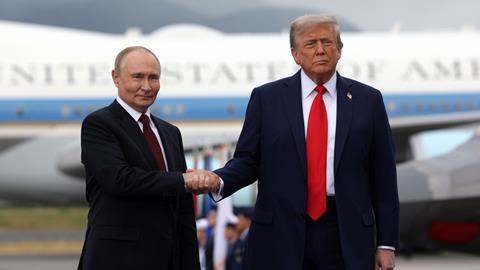The Alaska meeting on the Russia-Ukraine war between presidents Trump and Putin last Friday was the starting pistol for intense diplomatic activity. Discussions have focused on the distinction between de facto and de juro control of land, on security guarantees, and conjecture on how Russia’s tendency to untrustworthiness on international agreements might be managed.
But chaps (and Italian PM Giorgia Meloni), aren’t we forgetting something?
Since the start of Russia’s full-scale invasion, at least 19,546 Ukrainian children have been taken. The true number is likely significantly higher.
There is talk of a land deal. But no children deal is on the table. Like Vulgaria in Chitty-Chitty-Bang-Bang, this is land without children.
Yet the fate of the children, the fact of their having been taken, is a profound vulnerability for Russia, and for Putin personally.
While it is a positive legal step that the Council of Europe signed an agreement with Ukraine establishing a special tribunal for the crime of aggression against Ukraine at the end of June, the Kremlin appears unbothered.
Unlike when there is mention of the children.
The International Criminal Court has brought the only international charges to date over the conduct of the war by focusing on the children. As the ICC puts it: ‘There are reasonable grounds to believe that Mr Putin bears individual criminal responsibility.’
Putin can go to the US, but in 125 other countries he risks arrest. Because of the children.
And mention of the children may earn you a personal sanction from the Kremlin.
My friend Johanna Baxter, Labour MP for Paisley and Renfrewshire South, is on that list.
Earlier this year she had a fact-finding visit to Ukraine to gather evidence on the fate of the children. The report she wrote on her return details the numbers, decisions and actions that effected the discussions. And the names and circumstances of many individual children – Liza, Zorkin, Margherita, Anastasia, Myloka, Bohdan…
Autism, cerebral palsy, being eight months old – none of these characteristics deterred the act of abduction. The report (#ReturnTheStolenChildren | UK Friends of Ukraine) published on 23 April; her personal sanction from the Kremlin came within a day.
Her conclusion, expressed in the report, remains this: ‘Before any ceasefire is considered, before any peace agreement is signed, every stolen Ukrainian child must be safely returned home. There can be no true peace - not in Ukraine, not anywhere - until that fundamental justice is delivered. Anything less would be a betrayal of those children, their families, and the very principles we claim to defend.’
Earlier this month Melania Trump wrote to Putin in fairly opaque terms, urging him to restore the ‘melodic laughter’ and right to innocence of children, interpreted as a reference to the abductions.
Good. But it hasn’t got the fate of the children on the conference tables. And it didn’t lead to Russia backtracking on the creation of a database of Ukrainian ‘orphans’ – an online catalogue searchable by eye colour, sex and behaviour (reported earlier this month).
It is obvious to state that international law is under visible and significant stress on many, many fronts across the world.
But it is also worth noting that the legal position is far, far ahead of the mere aspirations of 1948’s Universal Declaration of Human Rights – the harder edge of treaties and conventions has been added, and they have relevance to the fate of the children. In asserting their rights, we are not starting from scratch.
In Vulgaria, children return thanks to the outrage, resolve and planning of the inventor Caractacus Potts. When the children are safe, that’s when he flies home.
I know the international situation is dangerous, negotiations are high stakes, and the outcome existential for whole countries.
Yet even given all that, I don’t understand why outrage, resolve and planning is evident on questions of land and security, but so far down the priority list when it comes to the children.
































1 Reader's comment